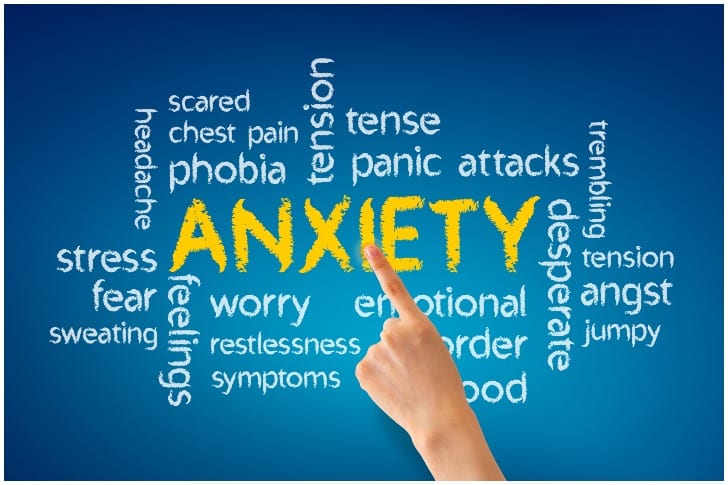
Do You Have an Anxiety Disorder? Here’s What You Should Do About It

While anxiety is your body’s natural response to stress, some people experience excessive worry, fear, and nervousness about the future.
This could be an Anxiety Disorder which is described in DSM-5 as a condition where feelings of worry are persistent, interfering with your daily life over several months.
Here’s everything you need to know about causes, symptoms, and how to manage it:
Types of Anxiety Disorders

Syda Productions/Shutterstock: Categorising anxiety
According to DSM-5, generalized anxiety, social phobia, specific phobia, separation anxiety, selective mutism, panic disorder, and agoraphobia are the seven types of anxieties.
Symptoms of Anxiety

Bildagentur Zoonar GmbH/Shutterstock: Identifying the symptoms
While feeling nervousness and pain is the main symptom, those suffering from the disorder also experience a range of physical and cognitive disturbances, including
- Increased heart rate
- Shallow, rapid breathing
- Restlessness
- Insomnia
- Fatigue, and
- Difficulty to concentrate
What Causes Anxiety?

fongbeerredhot/Shutterstock: Finding out the cause
Experts believe it’s a combination of environmental and genetic factors.
Besides, a stressful event such as a huge failure can affect you so much, that it becomes a trigger from then on, since it alters how your brain responds to that particular scenario.
Going through traumatic life events and social isolation can also make you more prone to developing anxiety.
Diagnosis
If you experience the symptoms mentioned here and believe you need more help, it’s best to find a licensed and trusted psychologist or therapist to talk to.
In some cases, even checkups may be needed to rule out any association with an underlying medical condition. It’s best to be completely honest as the professional tries to establish your history and feel confident to help them accurately diagnose you.
Treatment
Naturally, you’ll feel helpless if you get diagnosed. Still, it’s important to know that it’s perfectly possible to manage your anxiety and overcome it with the right treatment.
Depending on your anxiety type and level, your mental health professional may recommend a tailored treatment plan for you. In general, CBT or Cognitive Behavioral Therapy has been proven to be a great success in treating this condition.
It is done by helping you recognize your triggers better and equipping you with the right mindset and skills to navigate the thoughts that occur, resulting in better management of your anxiety symptoms.
If you’re pressed for time and resources, check out these online mental health service providers.
Medication
Your health care provider might prescribe medications like SSRIs and Benzodiazepines alongside talk-therapy or CBT. But it’s important to know that this is only safe if prescribed by your therapist. It’s also only a short term relief since they might cause other side effects.
Natural Remedies
Safe and natural home remedies you could try to better manage your anxiety are as follows
- Practicing breathing techniques
- Mindfulness meditation
- Regular exercise
- Getting enough rest and sleep, and
- Refraining from alcohol, drugs and caffeine consumption
While these will help you get started, you might need more advanced techniques to get your life back on track, depending on your anxiety levels. So it’s always best to seek medical help when you need it!
More in Medicare
-
`
Best Home Energy-Saving Devices
In our world today, where caring for the environment goes hand in hand with making smart financial choices, discovering ways to...
November 18, 2023 -
`
Amazon’s Ambitious Investment in Anthropic
In a bold move, Amazon has announced a massive investment of up to $4 billion in Anthropic, an AI firm based...
November 9, 2023 -
`
What Are Data Silos in Healthcare & How AI Can Help Tear Them Down
In the ever-evolving landscape of healthcare, data is the heartbeat that keeps the system running. It is the lifeblood that flows...
November 1, 2023 -
`
Free Rail Travel in Austria? But How?
Have you ever dreamed of exploring Austria’s breathtaking landscapes and vibrant festivals without spending a dime on train tickets for an...
October 19, 2023 -
`
The Rise & Fall of FaZe Clan
In the ever-evolving gaming collectives, one name has stood out above all others: FaZe Clan. However, this beloved gaming conglomerate is...
October 15, 2023 -
`
Everything You Need to Know About Vaccine Technologies
You might remember that little pinch on your arm or a quick jab to the thigh as a child: A momentary...
October 3, 2023 -
`
Opinion: The Worst Movies of All Time
In filmmaking, where creativity knows no bounds and storytelling takes center stage, there are bound to be both shining gems and...
September 26, 2023 -
`
Exploring the World of Alternative Alcoholic Drinks
When it comes to alcoholic beverages, many of us tend to think of the usual suspects – beer, wine, and spirits....
September 22, 2023 -
`
Why Robots Will Boost Human Employment
The looming specter of job-stealing robots has haunted the workforce for years. But what if this fear is mainly unfounded? In...
September 16, 2023















You must be logged in to post a comment Login